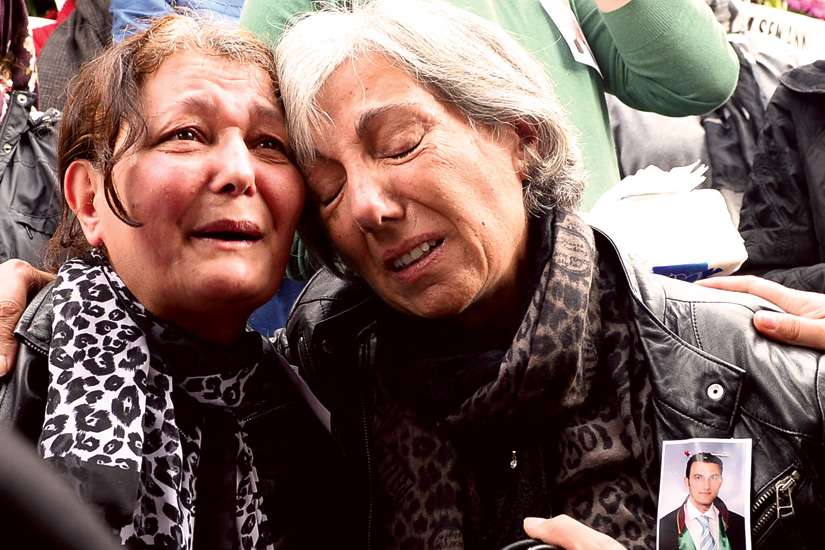Yet this is the very time the grieving person needs words and/ or actions of comfort.
Fr. Leo Hofmann is sensitive to what not to say when someone has died, such as “God only takes the good ones.” Or if a child dies, one shouldn’t tell the parents, “Oh, you are young. You can have another.”
He tells the story of a young father who died. Hofmann told the two small children, “That is your dad there. It doesn’t look like him and he can’t talk to you or breathe any more. You can touch him. You don’t have to. His hand will be kind of cold, hard, not like he is alive.”
Afterwards, the children came to him and said “Thank you.”
When he explained the mausoleum, everyone listened. “They didn’t understand why (the casket) was going in this cupboard.” He explained to them: “That way you can come and visit, and it won’t be rainy and cold outside. You can come any time of the day to visit.”
The secret is to “explain to the kids what they need to know for their age level. They can ask unusual questions but you never react. You explain it according to their reality.”
Hofmann’s compassion is seen when he asks the bereaved family to tell him the story of the person’s dying and death.
“You just sit and listen,” he said.
His pastoral assistant Linda Boire sits in and listens too as they complete the paperwork and make funeral decisions.
“We also ask questions and listen to them tell the story. We try to do this together because sometimes Linda is involved in doing the prayer vigil the night before if they have one. We both take notes furiously. Many hands make light work. We work with the family together.
“You always talk about the person even though the focus is always about the Scriptures and resurrection. Even if I do not know the person, have never met the person, I get an idea of how he or she lived the Gospel.”
One of the most favoured Edmonton priests to officiate at funerals is Fr. Mike McCaffery.
“I deal a lot with funerals over the years and with my own experiences,” said the welcoming priest. “I have two favourite authors that help me deal with people who have gone to Heaven or wherever — Fr. Henri Nouwen and Fr. Ron Rolheiser.
“They both tell us that sometimes when people die, our relationship can become more intimate than it ever was when they were alive. They are still with us. They are still near us. They still belong to us.
“We hold onto their memories, and they are in our hearts and in our life. They continue to teach me who I am now and where I am going and where I belong. They continue to send their spirit of love to me.”
McCaffery says he finds Nouwen’s and Rolheiser’s insights comforting.
“I think I experience that in my own life with my parents and loved ones, and will talk to them and feel their presence in a very special way. Ron Rolheiser said no matter how hard it is, even if it is death itself that takes away our loved ones, eventually he or she will come back to us in a deeper way in a presence that is warm, nurturing and immune to the fragility of a normal relationship.”
Oblate Father Frank Kuczera, pastor of Edmonton’s St. Charles parish, said it is important to be compassionate and sensitive to those who have experienced the loss of a loved one.
“We have to listen to their heart. Let them talk about the loved one who just passed away. Whatever memory they have, I think we need to speak about it — who he was and what does he know,” said Kuczera.
Then it is time for the pastor to assure the survivors “they are not alone — that Christ walks with them and so does the community support them and is with them.”
Kuczera urges those around the grieving people to be sensitive to where people are at. Have compassion to let them know it is a difficult time.
Remember too what not to do.
“It’s not a time to play judge, to try to judge someone when someone has done something wrong to us, if there has been a suicide,” cautioned Kuczera.
“Ultimately it is between that person and God. It is not about us.”
And do not forget them.
“Keep your door open,” urged the pastor, so people know they can call, they can come, they can talk.
“The connection we have with the people after the funeral is very important. Keep connecting with them and ask them how they are doing,” he said.
Questions can abound especially if there is the death of a child or teenager or a suicide.
“For many of these questions, we do not have the answers,” said Kuczera.
“We just have to trust that God is with them.”
(Western Catholic Reporter)


